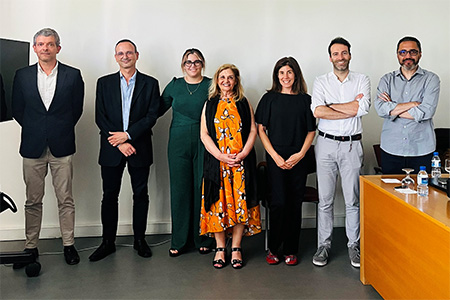Requested by:
Joana Rodrigues da Silva
Date, time and place
July 19, 14h30, room L119 DEMEC (FEUP)
President of the Jury:
António Fernando Vasconcelos Cunha Castro Coelho, PhD, Associate Professor with Habilitation, Departamento de Engenharia Informática, Faculdade de Engenharia da Universidade do Porto.
Members:
Teresa Isabel Lopes Romão, PhD, Associate Professor, Departamento de Informática, Faculdade de Ciências e Tecnologia da Universidade Nova de Lisboa;
Luís António Santos, PhD, Assistant Professor, Departamento de Ciências de Comunicação, Instituto de Ciências Sociais da Universidade do Minho;
Miguel Ângelo Rodrigues Midões, PhD, Invited Adjunct Professor, Departamento de Comunicação e Arte, Escola Superior de Educação do Instituto Politécnico de Viseu;
Helena Laura Dias de Lima, PhD, Associate Professor, Departamento de Ciências da Comunicação e da Informação, Faculdade de Letras da Universidade do Porto (Supervisor);
Alexandre Miguel Barbosa Valle de Carvalho, PhD, Assistant Professor, Departamento de Engenharia Informática, Faculdade de Engenharia da Universidade do Porto.
Abstract:
“After the COVID-19 epidemic and the consequent humanitarian crises that devastated the planet, there is a need to claim the role of investigative journalism as a watchdog and permeation system of social justice and democracy through public exposure. We are witnessing a sharp decrease in investment in this journalism specialty, either because of its impertinence in dealing with public management issues or because of the time spent on this type of investigation, which fundamentally takes longer than current journalism to produce results. In this sense, we perceive the influence of automation and artificial intelligence in information production processes to highlight all human tasks with the possibility of being carried out in less time by technological systems. Considering this possibility, there was an interest in studying, in-depth, how robotics and the application of artificial intelligence through platforms that support the usual procedure of journalism can help and even improve the global state of investigative journalism practice, nowadays. The Connect-the-Dots platform and the DODO assistant emerge as a hypothetical digital solution for some of the problems that investigative journalism currently faces. It could be a way to practically implement investigative journalism in its scope of innovation by integrating tools and open-source practices in a Design-Based-Research approach to knowledge archaeology.”
Keywords: Artificial Intelligence, Automation, Investigative Journalism, Design-Based-Research, Digital Media.
